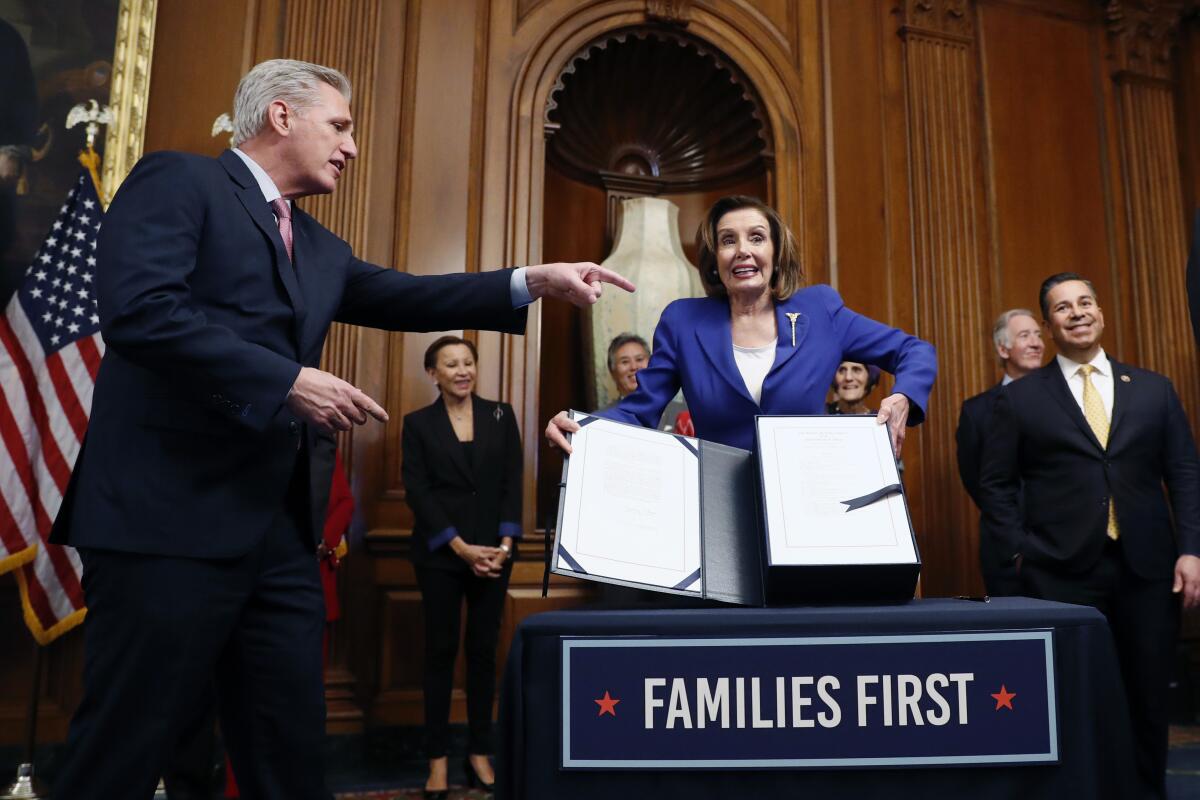Unions praised coronavirus aid for Hollywood workers. Now they say it falls short for some

Six weeks ago, Hollywood’s biggest unions were applauding a government plan that would extend unemployment benefits to self-employed and independent contractors that dominate the entertainment industry. But now some are calling for a fix after finding many of their members were locked out.
SAG-AFTRA, which represents 160,000 actors, musicians and other performers, along with other groups including the Writers Guild of America West, the American Federation of Musicians and the Recording Industry Assn. of America wrote to congressional leaders Nancy Pelosi and Mitch McConnell on Friday asking them to address critical flaws in the plan that has left many unable to access emergency support.
“For those of us in the creative field to survive — and recover — after this crisis, we must be able to access the full support intended by Congress,” the groups wrote in their letter. “Many in our profession work from project to project and gig to gig, not only in multiple jobs but in various capacities.”
A key problem is that these so-called hybrid workers working a variety of one-off projects find themselves receiving both W-2 wages and 1099 income for performances, royalties and other services, disqualifying them from receiving unemployment benefits.
The group calls for the program to be updated to allow individuals to show their mixed sources of revenue for a full accounting of their annual income.
A catch in the Pandemic Unemployment Assistance program could disqualify many workers.
The $2-trillion bipartisan coronavirus stimulus package known as the Coronavirus Aid, Relief and Economic Security Act, signed in March by President Trump, meant that nearly 3 million self-employed Californians, gig workers and independent contractors were eligible for special unemployment benefits. It triggered a wave of plaudits from entertainment industry groups as hundreds of thousands of people lost work. But many musicians and filmmakers found that even one day of work done more than a year ago that triggered a W-2 made them ineligible for assistance.
SAG-AFTRA alone projected that between 40,000 and 120,000 members would be able to get help under the program. But many found themselves shut out of the Pandemic Unemployment Assistance program, or PUA, a key provision of the CARES act.
Musicians in particular have been affected. Those who work on location or perform on tour earn freelance income in multiple states, some of which does not come with a 1099, the entertainment organizations said in their letter.
Launched in California on April 28, the PUA was aimed at helping business owners, gig workers and others who did not qualify for traditional unemployment or had exhausted their benefits. A loophole meant if they were on an employer’s payroll and earned wages of $1,300 or more during any quarter in the previous 18 months, that so-called W-2 amount would become the basis for unemployment benefits — and disqualify them from claiming their self-employment income.
Under the deal, any employee or contractor working in arts and entertainment who lost work due to the pandemic is eligible to access unemployment benefits, including an additional $600 weekly made available by the package through July. Unemployment benefits will be extended for an additional 13 weeks.
The group also said the Small Business Administration’s guidelines for the self-employed to access aid under the Paycheck Protection Program are “overly burdensome and restrictive.” The guidelines offer forgivable loans to small businesses that keep workers on the payroll during the economic shutdown caused by the pandemic.
The House has passed nearly half a trillion dollars for small-business loans in the Paycheck Protection Program amid the coronavirus crisis.
The group also complained that the SBA has limited the Economic Injury Disaster Loan grant of up to $10,000 to only $1,000 per employee, penalizing self-employed individuals.
“There is no sugar-coating this: The entertainment industry has been decimated,” they said. “When it’s time to once again open the doors to live performances, recording studios, soundstages and sets, entertainment will continue to need help.”
More to Read
Inside the business of entertainment
The Wide Shot brings you news, analysis and insights on everything from streaming wars to production — and what it all means for the future.
You may occasionally receive promotional content from the Los Angeles Times.












